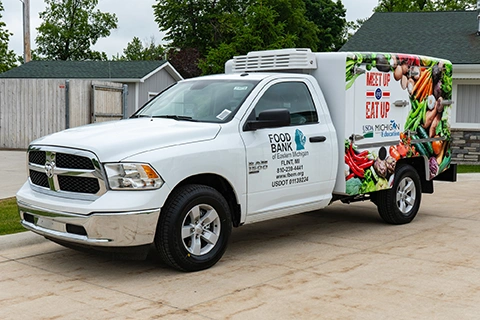For many students and families, the end of the school year also signals the end of access to school-provided free and reduced price meals.
*The 2025 Summer Food Service list will be updated throughout the summer. Parents can call (810) 396-0247 with any questions or concerns.
The Food Bank of Eastern Michigan helps fill this gap by providing healthy meals at our summer feeding sites throughout Genesee, Gladwin, Saginaw, and Lapeer counties.
Our Summer Food Service Program, funded by the United States Department of Agriculture (USDA) and administered by the Michigan Department of Education (MDE), aims to fill that gap, providing children with free, healthy meals during the summer months when school is not in session and when many children often face missing meals and lack of proper nutrition. Nationally, more than 21 million children receive free and reduced-price meals during the school year, but only 17% of these children participate in the Summer Food Service Program.
Every summer, the Food Bank partners with numerous feeding sites (currently 72) to help keep young people nourished and healthy. As a sponsor of the USDA’s Summer Food Service Program (SFSP), the Food Bank distributes more than 65,000 meals through daily deliveries to each location during the summer. Breakfast and lunch are provided daily by the Food Bank, as well as kid-friendly treats.
We don’t stop there—the Food Bank also strives to provide healthy snacks in our Summer Take Home Nutrition Bags. They are offered at every site and are for children to take home and enjoy over the weekend. The bags contain pre-cut vegetables, fresh fruit, granola bars, milk, and 100% juice. In 2024, the Food Bank distributed 7,584 nutrition bags to children in need.


Donate to the Food Bank! Every dollar you give can be leveraged to provide 6 meals for someone in need.
The U.S. Department of Agriculture (USDA) prohibits discrimination in all its programs and activities on the basis of race, color, national origin, age, disability, and where applicable, sex, marital status, familial status, parental status, religion, sexual orientation, genetic information, political beliefs, reprisal, or because all or part of an individual’s income is derived from any public assistance program. (Not all prohibited bases apply to all programs.) Persons with disabilities who require alternative means for communication of program information (Braille, large print, audiotape, etc.) should contact USDA’s TARGET Center at (202) 720-2600 (voice and TDD). To file a complaint of discrimination, write USDA, Director, Office of Civil Rights, 1400 Independence Avenue, SW, Washington, DC 20250-9410 or call (800) 795-3272 or (202) 720-6382 (TDD). USDA is an equal opportunity provider and employer.
For more information please contact James Stefanski at (810) 396-0247
